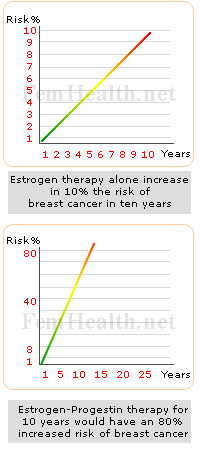Even though estrogen therapy brings several benefits such as relief from hot flashes and a lower risk of heart disease and osteoporosis, it does have an increased risk of breast cancer.

In fact, a recent study performed by Dr. Catherine Schairer and her colleagues from the NCI (National Cancer Institute) highlights the potential hazards of the long term use of estrogen therapy.
In fact, since 1970's, medical specialists know that women receiving estrogen therapy alone have high risk of developing cancer of the endometrium (the lining of the uterus). However, medical researchers developed a solution to avoid the cancerigenous effect of estrogen by adding progestin hormone, which was believed to neutralize it. In fact, the addition of progestin to estrogen therapy did reduce the risk of endometrial cancer. As a result, it became increasingly common to prescribe estrogen-progestin replacement therapy.
Nonetheless, recent results of a study published in the January 26, 2000 issue of the Journal of the American Medical Association found out if women who take estrogen in combination with the hormone progestin are at greater risk of developing breast cancer than women who take estrogen alone.
"The combined estrogen-progestin regimen might be associated with an increase in breast cancer risk beyond that associated with estrogen alone," said Dr. Schairer, of the NCI 's Division of Cancer Epidemiology and Genetics.
She and her colleagues used information from the Breast Cancer Detection Demonstration Project, a nationwide breast cancer screening program to compare the new cases of breast cancer with the type of hormone replacement therapy used for each group of women who had no previous evidence nor diagnosis of breast cancer.
There were 2082 cases of breast cancer identified during the 1980 through 1995 follow-up period.
She and her team compared the risk of developing breast cancer among 46,355 women divided in three main groups: women taking no hormonal therapy, those taking estrogen, and those taking both estrogen and progestin. The researchers also looked at how the length of time a woman takes hormone replacement therapy (HRT) affects her risk and how long that risk persists after stopping HRT.
After adjusting for age, education, body mass index, history of mammography and age at menopause, compared with women who had not taken HRT, the authors found the following results:
- The longer women took hormone replacement therapy, the higher the risks of getting breast cancer.
- Women who took estrogen-progestin during the last 4 years had a 40% higher risk of breast cancer than women who haven't used it.
- The relative risk of breast cancer increased by 1% for each year of estrogen-only use and by 8% for each year of estrogen-progestin-only use.
"Our results suggest that the combined estrogen-progestin regimen is associated with greater increases in breast cancer risk than estrogen alone," the authors write. "Assessing the comparative risk of estrogen alone vs. estrogen-progestin was complicated by the fact that use of estrogen alone was associated with increased risk.
The investigators also indicated that the study is not the final word on the topic of HRT and breast cancer risk. More studies evaluating longer-term use of estrogen in combination with progestin and different combination regimens of hormones are needed in the future. Decisions for women and their physicians should be made based on the individual considerations.
Schairer added that it would be important to study different types of combination therapy. Among women who take both estrogen and progestin, not all take progestin on a daily basis.
Several other issues are expected to be addressed in future studies. For example, it is not clear whether continuous progestin use carries the same risks as the use of progestins for 15 or fewer days per month, the most common regimen in this study. Additional studies are also needed to define the risks associated with long-term use of combined therapy.
Regardless of hormone use, Schairer said, "It's very important for all women to get periodic (breast cancer) screening. Women on hormone replacement therapy should be particularly careful." However, more research is needed to make firm conclusions about hormone replacement therapy and breast cancer risk.